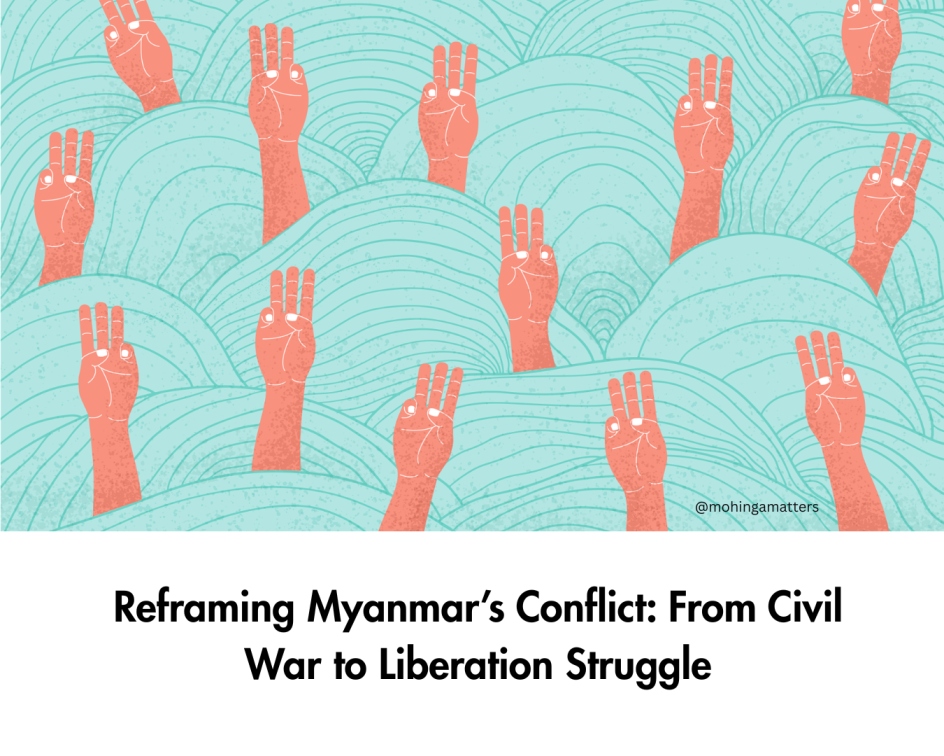
The contemporary conflict in post-coup Myanmar since 2021 is often described by international media and diplomatic circles as a civil war. Yet, this term has been repeatedly rejected by many within Myanmar: freedom fighters, civil society leaders, educators, and intellectuals alike. They advocate instead for a different conceptualization—one that reflects the moral and political stakes of the struggle: a revolution or liberation war against a tyrannical military regime.
In July 2023, Dr. Zaw Wai Soe, a high-ranking official in the National Unity Government, wrote in The Diplomat about the international misunderstanding of Myanmar’s crisis. Many foreign diplomats, he noted, insisted on describing the situation as a civil war, failing to grasp the legitimacy of the people’s uprising against a military institution widely viewed as illegitimate and criminal.
A member of the Kachin People’s Defense Force (Bhamo) offered a pointed critique of this narrative. “The world sees this as a civil war because of Myanmar’s long history of ethnic conflict after independence. But what’s happening now is different. This is a war between the people and the oppressor—the military itself. Students, youth, and ordinary citizens across all regions are now more united than ever, sacrificing everything. This is not a civil war; it is a revolution.”
Harry, a fighter with the Black Panther Force in Karen State, echoed this view, “This is a people’s power revolution. The whole country is participating. The world was silent when six million Jews were killed in the Holocaust—so we’re not surprised at the silence now. But we know it’s up to us. We must liberate ourselves, for our future and our children.”
In the liberated zones of Karenni State, educator and activist Khin Sandar Nyunt of Karenni College of Social Sciences and Humanities sees this revolution already shaping a future democratic Myanmar.
“We have functioning local governments in Karenni—judicial courts, police, education, and health systems—run by the Karenni political leadership and Karenni State Interim Executive Councils. This is not just war—it’s state-building. A civil war is fought over disagreements between factions of two or more. Our people are united to dismantle one institution: the military. That makes this a revolution.”
One of the leaders in the Japan-based NUG support team and fundraising campaigns offers a more cautious view. “From the outside, the conflict might meet the criteria of a civil war. But inside Myanmar, people see this as a fight for liberation and survival. Yes, technically, it may be ‘civil war’ in that we are fighting among ourselves. But the political reality is that we are fighting to remove an institution that has long oppressed us. This is a revolution toward a federal democratic future. I hope this is the end of the long conflict.”
To better understand this framing, we can turn to historian David Armitage’s essay Cosmopolitanism and the Civil War. Armitage opens with a line from Victor Hugo’s Les Misérables, in which Marius reflects: “There is neither foreign war, nor civil war; there is only unjust war and just war.”
Armitage shows that civil wars are not merely domestic disputes; they are morally, legally, and globally entangled. Drawing on thinkers like Vattel, Armitage notes that when rebels have just cause, civil war becomes a matter of international concern. In such cases, foreign powers must treat rebels as lawful combatants, not mere criminals in their rebellion against the unjust opposition.
Today, civil wars have also become globalized through refugee flows, foreign intervention, media narratives, and diaspora solidarity. Myanmar is a textbook case: the struggle touches not only its borders but also neighboring countries, international donors, and global public opinion.
Still, what the Myanmar people are asking is not simply the reclassification, but recognition—recognition that their fight is morally just, politically legitimate, and socially transformative.
If the international community insists on calling this a civil war, it must understand it as a global civil war. But those inside the country want the world to know this: this is not merely a war between factions. It is a revolution. A fight for justice, dignity, and democratic freedom.
As Armitage argues, “Every great revolution is a civil war.” But not every civil war is great. Myanmar’s struggle is one of the great ones.

